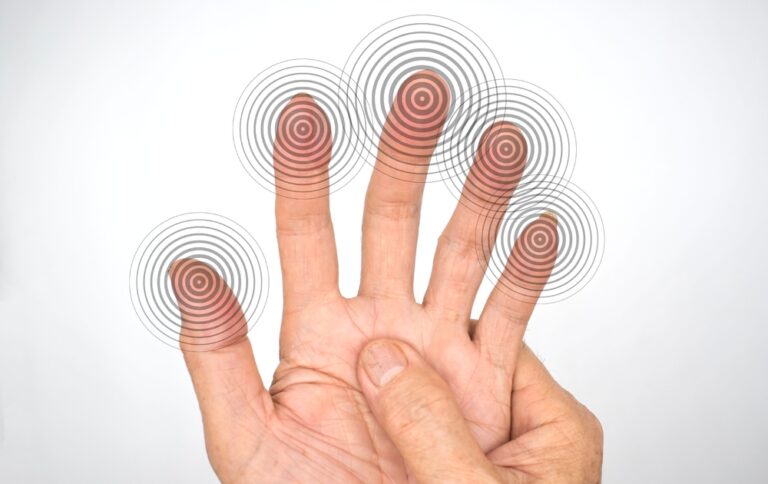Nerve damage, known as neuropathy in medical terms, can interrupt the communication between your brain, spinal cord, and the rest of your body. This disruption can lead to many annoying symptoms. These symptoms may include pain, numbness, tingling, and muscle weakness. Understanding the different types of neuropathy and their unique features is important because they can be complex.
Exploring the Different Types of Neuropathy
Classifying neuropathy into different types helps doctors determine where and how much nerve damage has happened. This leads to better diagnoses and specific treatment plans. Let’s look at four main types of neuropathy: peripheral, autonomic, proximal, and focal. Each type has its own set of issues and needs a special way to manage it.
Type 1: Peripheral Neuropathy
Peripheral neuropathy is the most common type of neuropathy. It affects the peripheral nerves, which connect your spinal cord to your arms and legs. This type of nerve damage can cause numbness, tingling, and pain in your hands and feet. People often say it feels like burning, prickling, or a “pins and needles” sensation.
Peripheral neuropathy can impact more than just your body. It can make balancing, coordinating, and performing fine motor tasks hard. To improve quality of life, managing the causes and finding ways to relieve symptoms is important.
Type 2: Autonomic Neuropathy
Autonomic neuropathy goes beyond just the sensory and motor nerves. It affects the nerves that control important body functions that usually happen without you thinking about them. This type of neuropathy influences your heart rate, blood pressure, digestion, bladder control, and sexual function. At first, the symptoms may be mild, but they often get worse over time.
The problems caused by autonomic neuropathy come from its effect on the processes that keep your body working well. For example, it might lead to dizziness when you stand up, problems controlling your bladder, or trouble regulating your body temperature. It’s important to recognize these signs early for effective treatment.
Treating autonomic neuropathy usually means managing the conditions that cause nerve damage. Changing your lifestyle, like eating better and exercising regularly, can help lessen the symptoms.
Type 3: Proximal Neuropathy
Proximal neuropathy, also called diabetic amyotrophy, causes pain in your hips, thighs, or buttocks. This type usually affects one side of your body more than the other. Weakness in your legs can make it hard to climb stairs or get up from a chair.
Proximal neuropathy is often linked to diabetes. It is a more focused form of nerve damage. The condition can be mild or can cause serious issues. Early diagnosis and treatment are important to stop further nerve damage and keep your mobility.
To treat proximal neuropathy, managing blood sugar levels is key. Pain relief can come from medication or physical therapy. In severe cases, using mobility aids might be needed to help you have a better quality of life.
Type 4: Focal Neuropathy
Focal neuropathy is unique because it targets a single nerve or a small group of nerves, resulting in very specific symptoms. This type of neuropathy happens when nerve signals to a certain area are harmed or interrupted. Common examples are carpal tunnel syndrome, which affects the wrist, and Bell’s palsy, which impacts the facial nerve.
One severe form of focal neuropathy is trigeminal neuralgia. It causes sharp facial pain that can feel like electric shocks. These specific symptoms often require special treatment methods.
Treating focal neuropathy might include medications, physical therapy, or even surgery to ease pressure on the affected nerve. Acting quickly is important for the best results in cases of focal neuropathy.
Neuropathy is not a one-size-fits-all condition—each type presents with its own challenges and requires a tailored approach to care. Whether you’re dealing with peripheral, autonomic, proximal, or focal neuropathy, early recognition and intervention are key to preventing further nerve damage and preserving your quality of life.
At N8 Family Chiropractic, we understand the impact that nerve pain can have on your daily life. Our team takes a holistic approach to care—addressing the root causes of nerve irritation through gentle chiropractic adjustments, lifestyle guidance, and individualized treatment plans. If you’re experiencing symptoms of neuropathy or want to take a proactive step toward better nerve health, we’re here to help. Let us support your journey to feeling your best—starting from the inside out.
References:
https://www.mayoclinic.org/diseases-conditions/peripheral-neuropathy
https://www.ninds.nih.gov/health-information/disorders/peripheral-neuropathy
https://my.clevelandclinic.org/health/diseases/14737-autonomic-neuropathy




